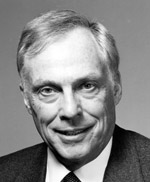| Sun | Mon | Tue | Wed | Thu | Fri | Sat |
|---|---|---|---|---|---|---|
| 1 | 2 | 3 | 4 | 5 | ||
| 6 | 7 | 8 | 9 | 10 | 11 | 12 |
| 13 | 14 | 15 | 16 | 17 | 18 | 19 |
| 20 | 21 | 22 | 23 | 24 | 25 | 26 |
| 27 | 28 | 29 | 30 | 31 |
CATEGORIES
RECENT ENTRIES
BLOG ROLL
Jensen wins "America's Nobel"

|
Following in four Chicago faculty members’ footsteps, Elwood Jensen, PhD’44, the Charles B. Huggins distinguished service professor emeritus in the Ben May Institute for Cancer Research, today received this year’s Lasker Award for Basic Medical Research.
Jensen shares the honor with Pierre Chambon, of the Institute for Genetics and Molecular and Cellular Biology, and Ronald Evans, of the Salk Institute for Biological Studies and the Howard Hughes Medical Institute. The trio’s discoveries, the award citation says, “revolutionized the fields of endocrinology and metabolism.”
Jensen was singled out for his research on how estrogen and other steroid hormones work, transforming “the treatment of breast cancer patients” and saving or prolonging “more than 100,000 lives annually.” On campus this afternoon, Jensen will address the “Discovery of Estrogen Receptor” at the Biological Sciences Learning Center.
Called “America’s Nobel,” the Lasker often is a precursor to the prestigious Swiss prize, as was the case for Chicago professors George Wells Beadle, Charles Huggins, and Roger Sperry, PhD’41. Double-helix codiscoverer James Watson, PhB’46, SB’47, also made the Lasker-to-Nobel leap. (Professor Janet Rowley, PhB’45, SB’46, MD’48, has won a Lasker but no Nobel.)
Meanwhile, bioterrorism expert Matthew Meselson, PhB’51, who earned an honorary Chicago doctorate in 1975, earned the Lasker Award for Special Achievement in Medical Science “for a lifetime career that combines penetrating discovery in molecular biology with creative leadership in the public policy of chemical and biological weapons.”
The Albert & Mary Lasker Foundation administers the awards, first presented in 1946. Recipients will receive an honorarium, a citation, and an inscribed statuette October 1 in New York.
M.L.
September 27, 2004
